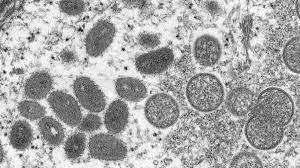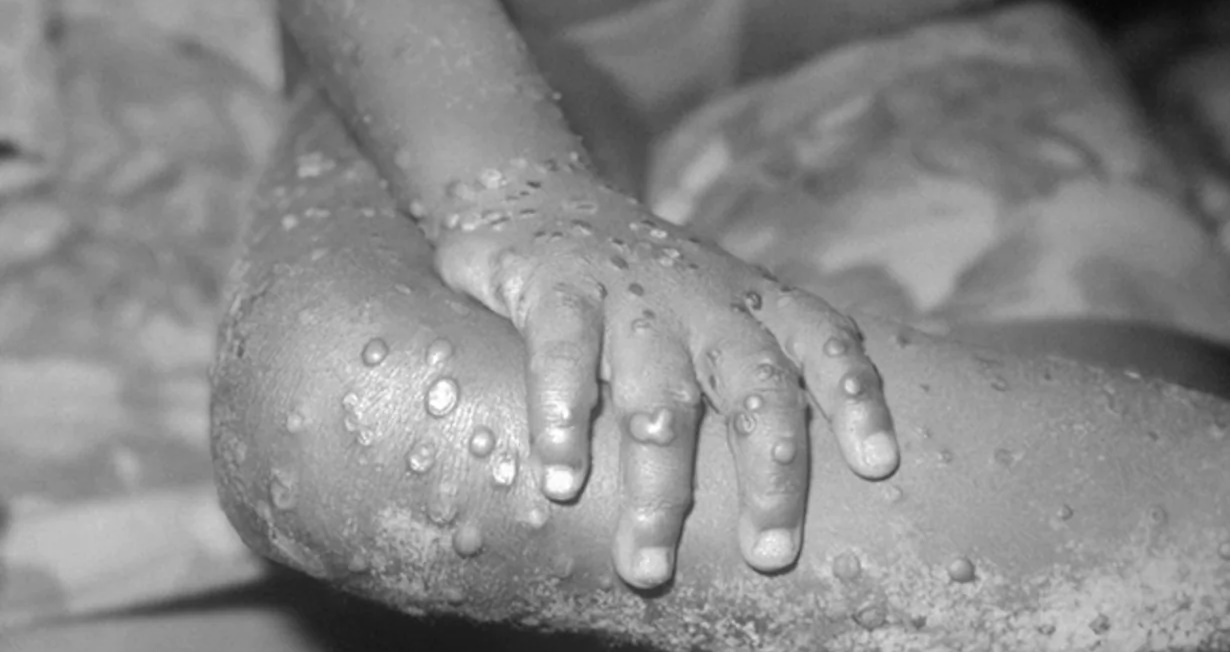
How dangerous is monkeypox? What is monkey pox?
Smallpox has long been one of the most dangerous diseases for humans. Vaccines came to the rescue, and since 1980 the world has been considered smallpox-free.
Now a related pathogen is spreading. How contagious is he? And is there effective protection?
Initially, it was a case in Great Britain that was probably imported from Nigeria. In the meantime, evidence and suspected cases of monkeypox are being reported from more and more countries. The extent is surprising and draws the attention of experts. What is this pathogen and how worrying is the outbreak? Questions and answers about this:
What is the current situation in Western countries?
Apparently, the pathogen has been spreading unnoticed in several western countries for a long time. As of Saturday, the WHO reports around 90 confirmed infections and 30 suspected cases in countries where the virus, which is native to West and Central Africa, does not normally occur.
In Europe, Spain, Portugal, Great Britain, Italy, Sweden, Switzerland and Germany, among others, are affected. There was also evidence of the disease in Australia, Canada and the USA. Experts expect a further increase in cases.
How is the situation in Germany?
Several cases of monkeypox have been confirmed in Germany. The virus was first detected in a patient in Munich who showed the characteristic skin changes.
The genome analysis of the pathogen at the Bundeswehr Institute for Microbiology showed that the patient was suffering from the milder West African of the two known virus variants, as announced by the Bavarian Ministry of Health. There were other cases of the monkeypox virus in Berlin.
What is monkey pox?
Monkeypox is a disease caused by a virus. The pathogen occurs primarily in the tropical rainforest areas of Central and West Africa in rodents or primates.
It was first detected in monkeys in a Danish laboratory in 1958 – hence the name monkeypox. However, experts suspect that the virus actually circulates in squirrels and rodents. Monkeys are considered false hosts. The monkeypox virus can also be transmitted to humans.

Smallpox, caused by a virus from the same group, used to spread great terror. A large proportion of those affected died from the infection. The smallpox disease has been eradicated since 1980 following vaccination campaigns. The last case in Germany was recorded in 1972.
What are the symptoms of monkeypox?
Symptoms include:
sudden fever
strong headache
back pain, sore throat
Cough
often also swollen lymph nodes
A typical smallpox rash that spreads from the face to the body is also typical.
“The rash usually begins within one to three days of the onset of the fever. The lesions can be flat or slightly raised, filled with a clear or yellowish fluid, and then crust, dry up and fall off,” writes virologist and medical doctor Sandra Ciesek on Twitter.
The number of lesions in a person can range from a few to several thousand, Ciesek said. They mainly appear on the face, palms and soles of the feet, but can also develop on the mouth, genitals and eyes. These rashes usually disappear after two to four weeks.
How dangerous is monkeypox?
According to the British authority UKHSA, the variant of the monkeypox virus that is circulating in Europe and the USA usually only causes mild symptoms, but can have severe courses.
The West African variant of the virus that occurs causes death in about one percent of those infected in Africa. Epidemiologist Paul Hunter from the University of East Anglia considers it very unlikely that diseases will be fatal in western countries. But it’s not impossible, he told the BBC.
Are complications possible?
“Unfortunately yes,” writes Ciesek on Twitter. The open skin lesions could become inflamed and superinfected with bacteria. An infection of the eyes with subsequent blindness is also possible. Rarely, pneumonia can also occur.
According to the virologist Ciesek, people with a restricted immune system or people who live under poor hygienic conditions are particularly at risk. “In Africa, fatalities have been observed in one to ten percent of cases.” However, the expert emphasizes that this number cannot be transferred to our living conditions.
How is the virus transmitted?
According to the RKI, transmission to humans generally occurs through contact with infected animals or animal blood and secretions, through eating infected monkey meat and through droplet infection.
According to the virologist Sandra Ciesek, infection from person to person can occur through close physical contact with an infected person. “Rashes, body fluids (such as liquid, pus or blood from skin lesions) and scabs are particularly contagious. But saliva can also be infectious if the patient has corresponding lesions in the mouth,” said Ciesek on Twitter.
Epidemiologist Hunter told the BBC the virus infects contacts by getting from the pustules of sick people into wounds or the eyes of contacts, and inhaling droplets containing the particles is also a way.
In the cases currently recorded, the majority are men who have had sexual contact with other men. The virus currently seems to be spreading mainly between homosexual or bisexual men, said Becker. However, intimate contact is only one possibility of transmission – it may be a coincidence that the virus was first carried to this group of people and then continued to circulate there.
How long is the incubation period?
The incubation period is between seven and 14 to 21 days. It is still unclear whether people without symptoms can also transmit the virus.
How contagious is monkeypox from person to person?
The virus is actually considered to be less contagious. With the current accumulation of infections, the detailed chains of infection are still largely unclear. For the first known case in Great Britain, the health authority UKHSA assumes that it is due to an infection in Nigeria. It remains to be clarified to what extent there were further entries from African regions into western countries.
However, it seems clear that the pathogen was then passed on to other people unusually often. The Marburg virologist Becker estimates that the transmission of monkeypox does not seem to take place through aerosols. “Then the pattern of propagation would be different.”
What other infectious diseases can monkeypox be confused with?
According to the UKHSA, at certain stages of the disease the rash can resemble chickenpox or syphilis. The RKI sensitized doctors in Germany: Monkeypox should also be considered as a possible cause in the case of unclear smallpox-like skin changes if those affected have not traveled to certain areas.
According to the RKI, men who have sex with men should “immediately seek medical care” if they have any unusual skin changes.
How is an infection detected?
As with the corona virus and other pathogens, the detection is carried out with a sample of the person concerned using a so-called PCR test.
Is there a protective vaccination?
There is no vaccine specifically approved against monkeypox in the EU. According to historical data, however, a smallpox vaccination protects against monkeypox – and probably for life. Older people who have still received the vaccination should therefore also be protected from monkeypox. Experts are currently discussing the possibility of at least protecting contact persons of monkeypox infected people with a vaccination.
The virologist Gerd Sutter from the Ludwig-Maximilians-University in Munich said “Zeit Online”: “We have so much stock of the classic smallpox vaccine, a live vaccine, in Germany that the entire population could be vaccinated.”
The vaccine Imvanex against smallpox has been approved in the EU since 2013. It is not approved for the prevention of monkeypox in the EU. The WHO points out that this vaccine is not available nationwide. They want to convene experts to discuss possible vaccination recommendations.
How is the infection treated?
The symptoms and possible secondary bacterial infections are usually treated. With the drug Tecovirimat, there is also an EU-approved treatment option for monkeypox.
Where does monkeypox usually circulate?
Monkeypox infections in humans have so far been known primarily from regions in West and Central Africa. The first case of monkeypox infection in humans was registered in 1970 in the Democratic Republic of the Congo, writes an international team of researchers in the journal Plos Neglected Tropical Diseases. The virus then spread to other African countries and was first detected outside of the continent in 2003.
According to the local health authority, 15 cases of monkeypox were recorded in West African Nigeria between January and the end of April this year. According to the WHO, there have been repeated outbreaks in Nigeria, Cameroon and the Democratic Republic of the Congo over the past five years.
Hardly anything is known about the infection process in the animal world. Larger outbreaks in Africa in animals are poorly documented, so there is no overview, said Elke Reinking, spokeswoman for the Friedrich Loeffler Institute (FLI).
Is the current outbreak unusual in people outside of Africa?
“The cases now occurring outside of Africa are unusual and must be carefully investigated and any further spread carefully monitored,” said the FLI on Thursday.
“In the past, the monkeypox outbreaks were limited in their spread,” said virologist Stephan Becker from the University of Marburg. Chains of infection between people are unusual and must be closely monitored.
The WHO called for rigorous tracing of all contacts of those affected. Clinics and the population would have to be made aware of the need for an unusual skin rash to be examined by specialist staff. If monkeypox is suspected, patients should be isolated.
According to the analysis presented in “Plos Neglected Tropical Diseases,” the global number of proven, probable, and suspected cases has increased more than tenfold over the past five decades. The researchers cite declining immune protection after the cessation of smallpox vaccinations in 1980 as a possible reason. Deforestation is also a possible cause or could act as an intensifier.
Overall, monkeypox is gradually gaining global importance, the researchers said. Marburg virologist Becker explained that it is not yet possible to assess whether the virus will occupy the niche that has been vacated by the eradication of smallpox.
Have you ever had an outbreak of monkeypox?
Outside of Africa, monkeypox infections in humans have only been detected a few times. However, the frequency seems to be increasing.
According to the WHO, in 2021 there were five recorded infections in the United Kingdom and the United States. Three times people who had been in Nigeria were affected, with one of these patients in Great Britain two family members staked themselves out.
Categories: General
